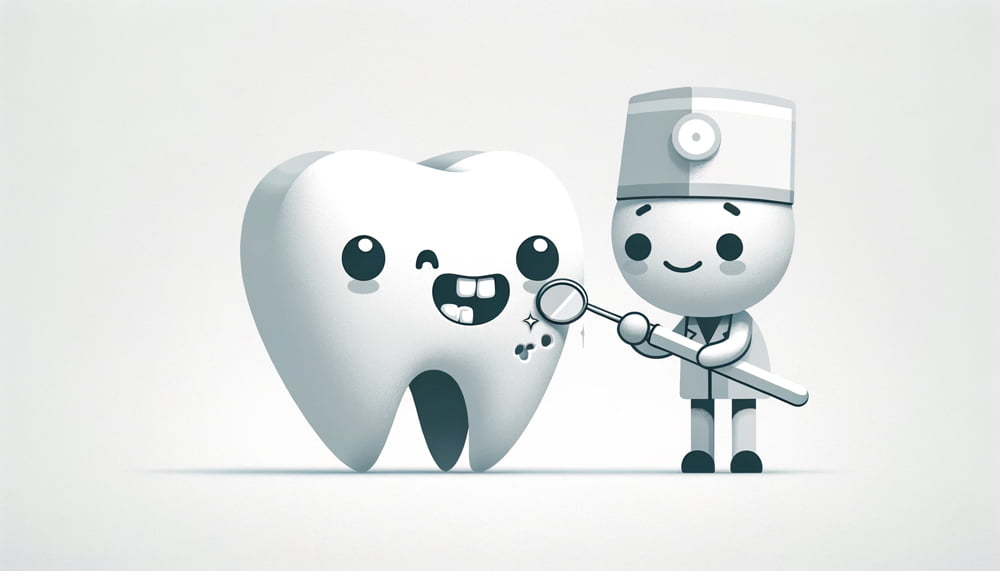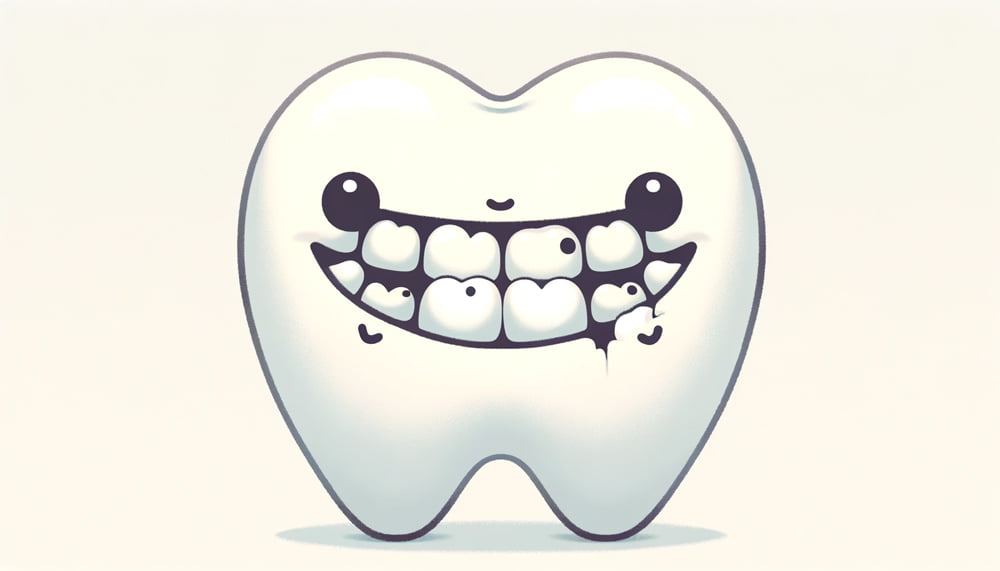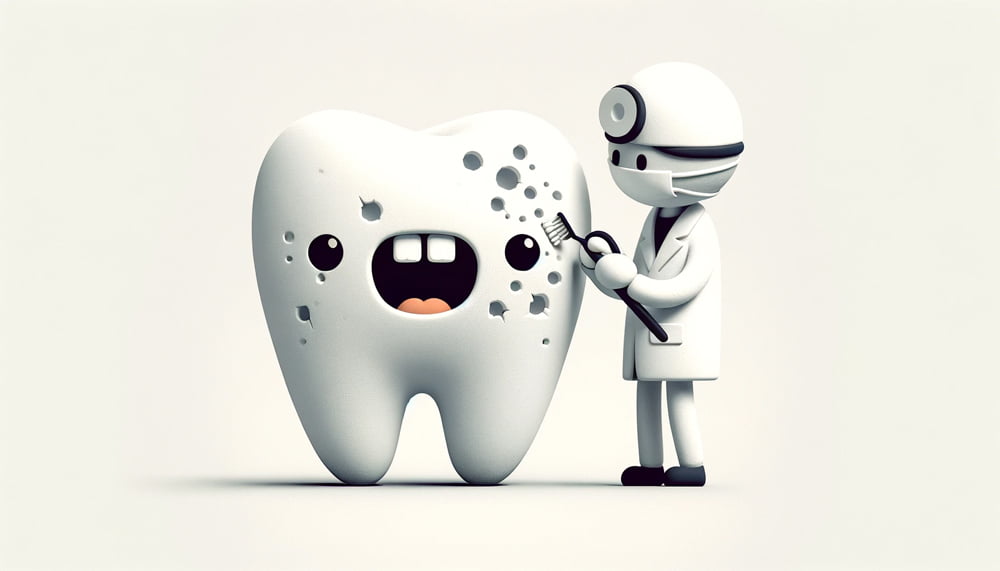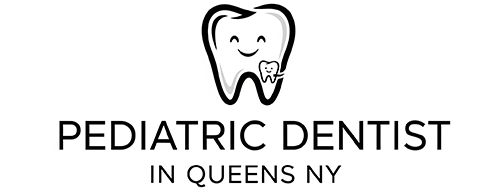Dental cleaning, a routine procedure in dental care, involves removing plaque and tartar from teeth to prevent cavities, gingivitis, and periodontal diseases.
While recognized for its benefits in maintaining oral hygiene, some concerns have been raised about its potential to damage teeth.
This article delves into the intricacies of dental cleaning, examining both its advantages and possible risks.
Can Dental Cleaning Really Damage Teeth?
While dental cleanings are generally safe, there are some concerns regarding tooth damage. These concerns primarily relate to the tools and techniques used during the cleaning process.
Enamel Erosion Concerns
One of the main concerns is enamel erosion. Enamel is the hard, outer layer of the tooth, and it’s crucial for protecting teeth against decay. Some worry that the scraping action during cleaning could wear down this layer.
How Enamel Erosion Can Occur
Enamel erosion during dental cleaning can occur if the procedure is not done correctly. Overzealous or improper use of cleaning tools can potentially wear down the enamel.
Sensitivity After Cleaning
Another concern is increased tooth sensitivity after cleaning. This is often temporary but can be uncomfortable for some patients.
Reasons for Sensitivity
Sensitivity after dental cleaning can result from the exposure of microscopic tubules located on the surface of the root of the tooth, which occurs when tartar that was covering them is removed.
Importance of Regular Dental Cleaning
Regular dental cleanings are crucial for maintaining oral health. They help prevent tooth decay, gum disease, and can also provide an opportunity for dentists to identify oral health issues early.
Techniques to Prevent Damage During Dental Cleaning

Dental professionals employ various techniques to minimize the risk of tooth damage during cleaning.
Gentle Cleaning Techniques
Using gentle, precise movements during cleaning can help protect the enamel. Dental hygienists are trained to clean effectively without applying excessive force.
Importance of Professional Training
Professional training is essential in ensuring that dental hygienists use the right amount of force and avoid aggressive techniques that could harm the enamel.
Advanced Dental Cleaning Tools
Advancements in dental technology have led to the development of tools that are less abrasive to the teeth. Ultrasonic scalers, for example, use vibrations to remove tartar gently.
How Ultrasonic Scalers Work
Ultrasonic scalers create rapid vibrations that effectively break down tartar and plaque. These vibrations are gentle enough not to cause enamel erosion.
Benefits of Dental Cleaning Outweigh the Risks
While the potential for damage exists, the benefits of dental cleaning far outweigh the risks when performed by a trained professional.
Prevention of Oral Diseases
Regular dental cleanings help prevent cavities, gingivitis, and periodontal diseases by removing plaque and tartar, which are the primary causes of these conditions.
Role in Early Detection of Dental Issues
Dental cleanings also allow dentists to identify and address potential oral health issues before they become severe.
Addressing the Concerns: What Patients Should Know

Patients should be aware of the potential risks and benefits of dental cleaning and understand what to expect during the procedure.
Discussing Concerns with Your Dentist
Patients should feel comfortable discussing any concerns they have with their dentist. A good dental professional will be willing to explain the process and how they minimize risks.
Importance of Open Communication
Open communication ensures that patients are informed and can make educated decisions about their oral health care.
Choosing the Right Dental Professional
Choosing a dentist who is experienced and well-regarded in the field can significantly reduce the risk of any potential harm during cleaning.
Criteria for Selecting a Dentist
Look for dentists with good reviews, relevant experience, and a commitment to continuing education in their field.
Understanding the Process of Dental Cleaning
A deeper look into what happens during a dental cleaning can help alleviate fears about tooth damage.
Steps Involved in Dental Cleaning
Dental cleaning typically involves an initial examination, followed by the removal of plaque and tartar, polishing of the teeth, and sometimes fluoride treatment.
Examination Phase
The examination phase allows the dentist to assess the health of your teeth and gums before proceeding with the cleaning.
The Role of Plaque and Tartar Removal
Removing plaque and tartar is central to preventing tooth decay and gum disease. This is done using various tools, including scalers and ultrasonic devices.
Techniques Used in Plaque and Tartar Removal
The techniques used are designed to be effective yet gentle on the teeth, minimizing any risk of damage.
Post-Cleaning Care and Advice

After a dental cleaning, there are steps you can take to ensure your teeth remain healthy and minimize any discomfort.
Recommendations for Oral Hygiene
Good oral hygiene practices, such as regular brushing and flossing, are essential after a dental cleaning to maintain oral health.
Tips for Reducing Sensitivity
If you experience sensitivity after a cleaning, using a toothpaste designed for sensitive teeth can help alleviate discomfort.
Importance of Regular Dental Visits
Regular dental visits are crucial for maintaining oral health and ensuring any potential issues are addressed promptly.
Frequency of Dental Cleanings
It is generally recommended to have a dental cleaning every six months, though your dentist may suggest a different frequency based on your individual oral health needs.
Debunking Myths About Dental Cleaning
There are many myths and misconceptions about dental cleaning that can cause unnecessary worry.
Myth: Dental Cleaning Weakens Teeth
One common myth is that dental cleaning weakens teeth. This is not true when the cleaning is performed correctly by a professional.
Clarifying the Facts
Professional dental cleanings remove harmful plaque and tartar without damaging the tooth structure.
Myth: Dental Cleaning Is Painful
Another misconception is that dental cleaning is a painful process. In reality, most patients experience little to no discomfort.
Addressing Fear of Pain
If you have concerns about pain, discuss them with your dentist. They can provide reassurances and explain the measures taken to ensure comfort during the procedure.
FAQs About Dental Cleaning
To further clarify any doubts, here are some frequently asked questions about dental cleaning.
Is Dental Cleaning Necessary for Everyone?
Yes, dental cleaning is an essential part of oral hygiene for everyone. It helps in preventing a variety of dental issues.
Individual Variations in Dental Cleaning Needs
While everyone can benefit from dental cleaning, the frequency and type of cleaning may vary based on individual needs.
Can Dental Cleaning Cause Gum Recession?
Gum recession is typically caused by gum disease or aggressive brushing, not by professional dental cleaning.
Understanding the Causes of Gum Recession
Understanding the true causes of gum recession can help in addressing this concern more effectively.
The Role of Technology in Dental Cleaning
Advancements in dental technology have made dental cleaning more efficient and safer than ever.
Innovations in Dental Cleaning Tools
New tools and techniques have been developed that are more effective at removing plaque and tartar while being gentle on the teeth.
Impact of Technology on Dental Cleaning Safety
These technological advancements have greatly reduced the risks associated with dental cleaning.
Making an Informed Decision About Dental Cleaning
It’s important for patients to be well-informed about dental cleaning and its implications on dental health.
Evaluating the Pros and Cons
Understanding both the benefits and potential risks of dental cleaning can help in making an informed decision.
Seeking Professional Advice
Always consult with a dental professional to get personalized advice based on your oral health condition.
Final Recommendations for Optimal Oral Health
To conclude, dental cleanings are a vital part of maintaining good oral health. While there are some concerns about potential tooth damage, these are minimal when the cleaning is done by a professional.
Emphasizing the Importance of Dental Cleanings
The importance of regular dental cleanings in preventing oral diseases and maintaining overall dental health cannot be overstated.
Encouraging Proactive Dental Care
Proactive dental care, including regular cleanings and good oral hygiene practices, is the key to a healthy mouth and a bright smile.

Mary – Queens Pediatric Dental Resource Manager. I’m a dental health researcher and parent advocate based in Queens, NY. After struggling to find reliable pediatric dental information during my own child’s dental emergency, I created this resource to help other Queens families navigate their children’s oral health needs.
I curate evidence-based information from leading pediatric dental organizations, peer-reviewed research, and trusted dental health experts. While I’m not a dentist, I’m committed to providing accurate, practical guidance that helps parents make informed decisions.
All content is thoroughly researched and includes proper medical disclaimers directing families to consult qualified pediatric dentists for their children’s specific needs.
